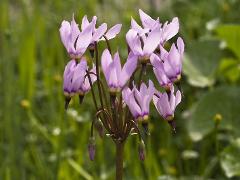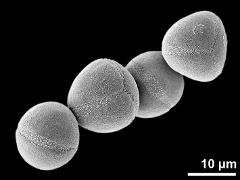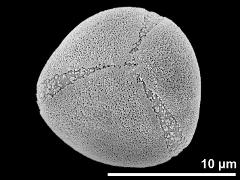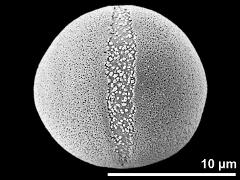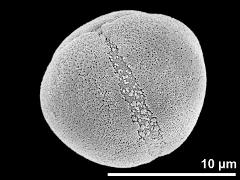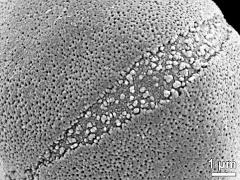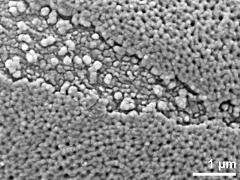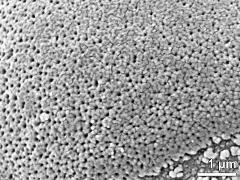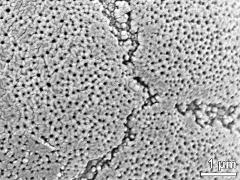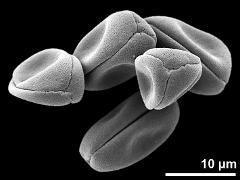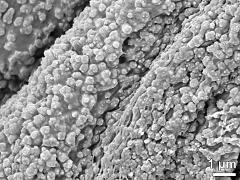Primula meadia
Taxonomy: Angiospermae, Ericales, Primulaceae, Primula
Published: 2016-12-02
Pollen Description
Shape, Size and Aperture
pollen unit: monad, dispersal unit and peculiarities: monad, size (pollen unit): small (10-25 µm), size of hydrated pollen (LM): -, shortest polar axis in equatorial view (LM): -, longest polar axis in equatorial view (LM): -, shortest diameter in equatorial or polar view (LM): -, longest diameter in equatorial or polar view (LM): -, pollen class: synaperturate, polarity: isopolar, P/E-ratio: -, shape: spheroidal, outline in polar view: circular, dominant orientation (LM): -, P/E-ratio (dry pollen): prolate, shape (dry pollen): -, outline in polar view (dry pollen): triangular, infoldings (dry pollen): interapertural area sunken, aperture number: 3, aperture type: colpus, aperture condition: colpate, syncolpate, aperture peculiarities: synaperturate, aperture membrane ornamented
Ornamentation and Structure
LM ornamentation LM: -, nexine: -, sexine: -, SEM ornamentation SEM: perforate, suprasculpture SEM: -, TEM tectum: -, infratectum: -, foot layer: -, endexine: -, intine: -, wall peculiarities: -, supratectal element: -
Miscellaneous
pollen coatings: -, reserves in cytoplasm: -, cell number: -, Ubisch bodies: present
Annotations: shape hydrated spheroidal to slightly oblate with triangular outline; colpate or colporate (?)
Author(s) of diagnosis: Halbritter, Heidemarie
Pictures
Picture legend
- inflorescence(s), photographer: Buchner, R.
- hydrated pollen grains - fresh, rehydration (water) & critical point dried & sputter coated with gold, photographer: Halbritter, H.
- polar view - fresh, rehydration (water) & critical point dried & sputter coated with gold, photographer: Halbritter, H.
- equatorial view - fresh, rehydration (water) & critical point dried & sputter coated with gold, photographer: Halbritter, H.
- oblique view - fresh, rehydration (water) & critical point dried & sputter coated with gold, photographer: Halbritter, H.
- aperture - fresh, rehydration (water) & critical point dried & sputter coated with gold, photographer: Halbritter, H.
- detail of aperture - fresh, rehydration (water) & critical point dried & sputter coated with gold, photographer: Halbritter, H.
- exine surface - fresh, rehydration (water) & critical point dried & sputter coated with gold, photographer: Halbritter, H.
- polar area - fresh, rehydration (water) & critical point dried & sputter coated with gold, photographer: Halbritter, H.
- dry pollen grains - dry, sputter coated with gold, photographer: Halbritter, H.
- Ubisch bodies on inner anther wall - fresh, rehydration (water) & critical point dried & sputter coated with gold, photographer: Halbritter, H.
Literature
- (1984) Pollen morphology and heterostyly - a systematic and critical account. Adv Pollen - Spore Res 12: 79-126
- (1993) Pollen exine dimorphism in ten heterostylous species. J Palynol 29: 77-88
- (1916) Zytologische und embryologische Studien über die Reihen Primulales und Plumbaginales. Kungl Svenska Veten Handl 56: 1-80
- (1985) Morfología polínica de la familia Primulaceae en Andalucía occidental. An Asoc Palinol Leng Esp 2: 107-115
- (1970) Morphologie des grains de pollen de quelques Myrtaceae et Primulaceae. Vest mosk Univ 6 25: 47-52
- (1970) The Primulaceae of Taiwan. Taiwania 15: 51-72
- (1974) Scanning electron microscopic observations of pollen grains and stigma in the self incompatible heteromorphic species Primula malacoides Franch. and Forsythia x intermedia Zab and genetics of sporopollenin deposition. Euphytica 23: 337-344
- (1986) The evolution of distyly in Primula vulgaris. Biol J Linn Soc 29: 123-137
- (1974) Primulaceae. Rev Palaeobot Palynol, NEPF 17: 31-70
- (1992) Pollen et spores d'Europe et d'Afrique du Nord. Laboratoire de Botanique historique et Palynologie, Marseille : 520 pp, 446 pl
- (1993) Primula. Batsford Ltd, London : 299 pp
- (1962) Die Bedeutung der Pollenmorphologie für die Taxonomie der Primulaceae-Primuloideae. Feddes Rep 65: 149-214
- (1968) Floral anatomy and embryology of Primula floribunda Wall. Phytomorphology 18: 105-113
- (1960) Considérations palynologiques sur les représentants de la famille des Primulacées de la flora Roumaine. Com Ac RPR 10: 111-118
- (1961) Studies in Primulaceae - II. An account of Primula subgenus Sphondylia with a review of the subdivisions of the genus. Ab Univ Bergen matnaturv Ser 11: 1-49
- (1998) Preparing living pollen material for scanning electron microscopy using 2,2-dimethoxypropane (DMP) and criticalpoint drying. Biotechnic Histochem 73: 137–143
Copyright and Citation
Cite this publication as:
Halbritter H., Buchner R. 2016. Primula meadia. In: PalDat - A palynological database. https://www.paldat.org/pub/Primula_meadia/302633;jsessionid=FB987106F3E67E0F4B742223E0481631; accessed 2024-04-20

